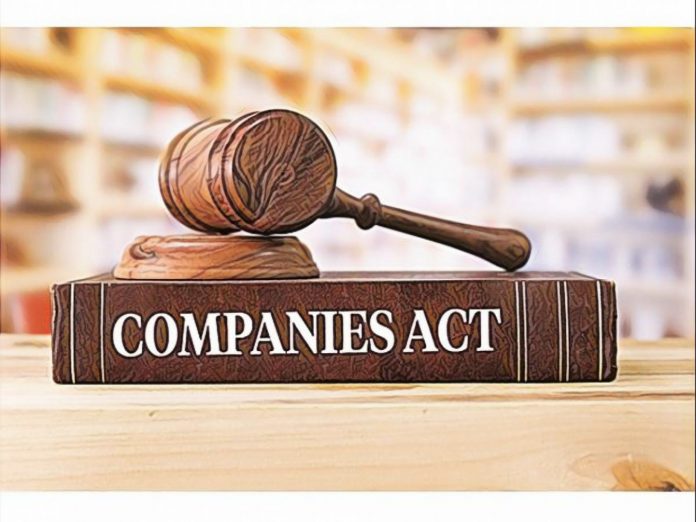This article has been authored by Bhavika Mittal, pursuing BA LLB at Shri Navalamal Firodia Law College, Pune. This article is a detailed account of Section 447 of the Companies Act, 2013, which lays down punishment for committing fraud. The punishment, amendment and the broad scope of the Section are mentioned. Also, it discusses the importance of such legislation due to the increase in white-collar job crimes.
it has been published by Rachit Garg.
Table of Contents
Introduction
Society evolves over time, and so do its inhabitants. Parallelly, the upgradation of laws is always advisable. For instance, the 1956 Companies Act has been replaced with a new legislation, the Companies Act, of 2013, owing to the drastic transition in the corporate sector within the past decade. The changes over the years have been negative as well as positive. One such negative change is the increase in the commission of wrongful acts like a fraud. There are numerous ways by which fraud is committed in white-collar jobs. Therefore, there was a dire need to enact stringent laws to curb such acts.
The amended act of 2013 brought into force the provision punishing fraud. Chapter XXIX, titled “Miscellaneous”, provides Section 447, which explains the meaning of fraud and lays down punishment for the same. The meaning, nature and punishment of fraud are exhaustively discussed herein. Additionally, the article sheds light on the guiding principles of the section, ethics and morality.
Fraud under the Companies Act, 2013
In layman’s language, fraud is misleading conduct done by someone to get an undue advantage or infringe others’ rights. But the term fraud has been diversly defined in various legislations pertaining to their respective nature.
The Companies Act 2013, under the explanation to Section 447, defines fraud in relation to the affairs of a company or any corporate body. It includes any-
- act, omission, concealment of facts or abuse of position committed by any person, or
- with connivance with other person with the intent to deceive or take undue advantage or to injure
- The interests of the company, its shareholders, creditors, or any other person, irrespective of any wrongful gain or loss.
Fraud is categorised as a wrongful act since it involves gaining benefits via false statements, deception etc. Basically, at the expense of the rightly deserved another. The act of fraud intervenes with the principle of business ethics. The importance of functioning ethically has increased and is contemplated to follow the same trajectory.
Why the rise? The corporate sector’s success benefits the company and leaves a positive impact on the economy. And with it, there is a growth in expectations from companies to contribute to society equivalently.
The concept of Corporate Social Responsibility (CSR) ensures the active fulfilment of such duty. This activity is not new but is now mandatory legal compliance by the revamped Companies Act of 2013.
Therefore, to uphold the principle and ensure economic growth and development, enacting such a section is imperative. Because according to a study by Assocham and Grant Thornton in 2015, corporate fraud in India has risen by forty-five per cent in two years. Corporate fraud affects the company and its employees and inadvertently causes losses of public funds.
In Vikas Agarwal v. Serious Fraud Investigation, (2019), the Delhi High Court held that there is no bar of limitation under Section 447. The companies, as well as any other person involved in any manner, can be prosecuted for fraud. In the instant case, the petitioner and three others were accused of indulging in illegal mining activities which were part of a larger conspiracy. The court dismissed the petition and held the trial court’s jurisdiction to proceed against the petitioner legally.
Thus, the section’s broad purview deters the commission of corporate fraud in large numbers.
Liability of persons committing fraud
Every act or activity conducted by a person makes him or her legally responsible that is liable. There are different types of liabilities. When a person commits the offence of fraud, that person is said to be criminally liable.
To establish the claim of criminal liability, first, the act committed by the person shall be within the scope of his or her employment. Second, the act shall benefit the organisation as an act performed by an employee is not different from the act of the organisation.
The long-standing debate on whether a company can be held liable has concluded substantially with the enactment of the Companies Act of 2013. The new legislation holds “any person” criminally liable for fraud.
Punishment for fraud under Section 447 of the Companies Act, 2013
Where the offence of fraud, as elucidated under explanation to Section 447 of the Companies Act, 2013, has been committed. The person found guilty of such an offence shall be-
- Imprisoned for not less than six months but which may extend to ten years, and
- Liable to pay a fine not less than the amount involved in the fraud but may extend to three times the amount involved in the fraud.
Further, as per the provisos to the section, the punishment varies as follows.
Fraud involving public interest
Where the fraud in question involves public interest, the term of imprisonment shall not be less than three years.
Fraud involving amounts less than ten lakhs or one per cent
This provision has been inserted by Act 1 of 2018. If any person is found guilty of committing such fraudulent activity, the person will be punished with
- imprisonment for a term which may extend to five years or
- with a fine which may extend to fifty lakh rupees or
- or both
But before the Act 22 of 2019, the fine was twenty lakh rupees instead of fifty lakhs.
In order to convict a person under this proviso, it must be ensured that the fraud involves
- Amount less than ten lakhs or
- One per cent of the turnover of the company,
Whichever is lower and does not involve public interest.
Under the Companies Act 2013, the punishment for fraud is not restricted but is applicable to other provisions of the act. There are approximately seventeen such sections in the act, where the punishment read under Section 447 is attracted. The sections which invoke the penalty of fraud include those cases as mentioned in other provisions of the act and claims that fall within the meaning of the definition of fraud under Section 447. Some instances are as follows-
- Section 448
Section 448 deals with cases of making false statements or omission of facts, in both cases knowing the reality of the same. The false statements in relation to statements, returns, prospectus or any other document.
- Section 251
Section 251 deals with fraudulent applications for the removal of names. If an application is made with a fraudulent intent to evade the company’s liabilities, it shall be liable under Section 447.
- Section 229
Section 229 deals with penalising any officer or any person or any employee of the company who is required to provide information or make a statement at the time of inspection, instead furnishes a false statement or destructs documents or mutilates the same.
- Section 86
Section 86 states the punishment for contravention. Section 86(2) invokes Section 447 when any person wilfully furnishes false or incorrect information or knowingly suppresses material information.
- Section 8
Section 8 deals with the formation of companies with charitable objects. Section 8(11) of the act invokes Section 447, where the company does not comply with the requirements of the section for conducting the affairs and uses fraudulent methods.
Further, in order to initiate proceedings and punish any person under Section 447 of the Act, the procedures mentioned under various other complimentary and supplementary shall be complied with. Section 212 and Section 213 of the Companies Act, 2013, have been explained below with the help of case laws.
Additionally, Section 439 of the act also comes into the picture as the exception to Section 439 categorises the offence of fraud under Section 447 as a cognisable offence. Other sections of the act are non-cognizable.
Case laws
The bar of cognisance
Mr. Nekkanti Venkata Rao v. Jakka Vinod Kumar Reddy, 2022
In Mr Nekkanti Venkata Rao v. Jakka Vinod Kumar Reddy, (2022), the Telangana High Court brought into light a crucial section of the Companies Act, 2013, which complements Section 447 of the Act.
Section 212(6) of the Companies Act, 2013, prevents burdening of courts from initiating trials on the basis of frivolous complaints. The section states that a prosecution under Section 447 could only be initiated after conducting an investigation, as not every complaint can be accepted. Thus, setting a bar of cognisance.
In the instant case, the company of the respondent and his brother is in dispute. The petitioner, whose criminal proceedings were later allowed and the pending proceedings before the Additional Metropolitan Sessions Judge and Special Judge for Economic Offences were quashed.
The petitioners and others were alleged to have committed an offence under Section 447, Section 448 and Section 451 of the Companies Act, 2013. The petitioner’s sister had induced the respondent and his brother to make her the director.
Later, it was disclosed that they allegedly played with the company’s finances through forgery and the fabrication of documents. The act of filing a complaint alleging the petitioner for fabrication almost after a decade showcases malafide intention. Additionally, the procedure laid down by the act was not complied with. Wherein the company’s registrar is competent to hold an enquiry, make a report and send it to the Government for investigation by Serious Fraud Investigation Office (SFIO). But in the instant case, the respondent had directly filed the complaint.
Thus, the court held that a private complaint under Section 447 of the Companies Act, 2013 is not maintainable in front Special Court and that a proper procedure for filing complaints shall be followed.
Sri. M Gopal v. Sri. Ganga Reddy, 2022
In Sri. M Gopal v. Sri. Ganga Reddy, (2022), thus quashing the order passed by the Magistrate. In the instant case, the petitioner and the respondent are directors of the company. The private complaint alleged the petitioner for defrauding the company and the complainant.
The Karnataka High Court held that for a shareholder to avail the provisions of Section 447 of the Companies Act against a fraudulent act, he should follow the procedure as contemplated under Section 213.
Under Section 213, once the Inspector has submitted a report showcasing or suggesting the offence of fraud to the Tribunal. The tribunal or the shareholder can refer the report to SFIO to commence with the proceedings under Section 447 as mentioned under Section 212(6) of the Act. Thus, if the requirements of Section 213 are fulfilled, the procedure mentioned under Section 212 of the Companies Act, 2013 is commenced.
The court further held that shareholders have remedies irrespective of minority or majority. So, no shareholder can on his own initiate proceedings under Section 447 of the Companies Act, 2013.
Section 212(6) of the Act explicitly states that no court shall take cognisance of a complaint unless it is made by the Director, SFIO or by an officer of the Central Government. The offence under Section 447 is cognisable, creating a bar on shareholders.
Conclusion
The procedure of proving an accused is guilty has been explicitly laid under the new act of 2013. The introduction of the National Financial Reporting Authority (NFRA) for monitoring corporate finance ensures financial statements are evaluated without any discrepancy. Additionally, the powers and requirements of SFIO have increased. Now, the overlap of regulatory authorities is avoided, and SFIO functions as the sole agency.
Fraud is an intentional or deliberate act to take undue advantage of another and deprive another of property or money. When a company or an employee is accused of committing fraud, the reputation developed over the years is at stake. But with the introduction of such legislation, they compel corporates to re-evaluate and introduce stringent rules, if required, for the prevention of fraud. Therefore, Section 447 not only punishes but also works as a deterrence.
Frequently Asked Questions (FAQs)
What is wrongful gain under the Companies Act 2013?
The explanation clause (ii) to Section 447 defines wrongful gain as the gain of unlawful means of property to which the person gaining is legally entitled.
What is wrongful loss under the Companies Act 2013?
The loss by unlawful means of property to which the person losing is legally entitled. Such has been defined under explanation clause (iii) to Section 447.
What is SFIO?
SFIO stands for Serious Fraud Investigation Office. It is a multi-disciplinary organisation under the Ministry of Corporate Frauds. It has been set up to deal with severe and complex frauds under the Companies Act of 2013. It also aids in detecting and recommending prosecution against crimes under the Act.
Whether the offence of fraud is compoundable or non-compoundable?
The offence of fraud under Section 447 is non-compoundable.
References
- https://www.asialawoffices.com/8266-/private-complaint-for-fraud-u-s-447-of-companies-act-not-maintainable-before-special-court-for-economic-offences-telangana-high-court/#:~:text=6%3A16%20PM,Telangana%20High%20Court
- https://taxguru.in/company-law/shareholder-initiate-proceedings-magistrate-alleging-fraud-u-s-447-companies-act-2013
- https://papers.ssrn.com/sol3/papers.cfm?abstract_id=2528379#:~:text=Share%3A-,Corporate%20Social%20Responsibility
- https://economictimes.indiatimes.com/news/company/corporate-trends/corporate-fraud-in-india-rose-45-last-two-years-study/articleshow/
- https://taxguru.in/company-law/section-447-companies-act-2013-fraud-invoked.html#:~:
- https://www.myadvo.in/blog/corporate-criminal-liability-in-india/#:~:text=Corporate-,Corporate%20Criminal%20Liability%20in%20India,-Corporate%20criminal%20liability
- https://www.icsi.edu/WebModules/CompaniesAct2013/Annexure-B.pdf
Students of Lawsikho courses regularly produce writing assignments and work on practical exercises as a part of their coursework and develop themselves in real-life practical skills.
LawSikho has created a telegram group for exchanging legal knowledge, referrals, and various opportunities. You can click on this link and join:
Follow us on Instagram and subscribe to our YouTube channel for more amazing legal content.
 Serato DJ Crack 2025Serato DJ PRO Crack
Serato DJ Crack 2025Serato DJ PRO Crack










 Allow notifications
Allow notifications


